Camp MacKall & the 11th Airborne Division are born
The original idea for an American airborne came from Gen. Billy Mitchell in 1918. His commander, Gen. Pershing agreed, but once the WWI Armistice was signed, the plan was terminated. In the late 1920’s, Germany began training parachute units and in the 1930’s, and they led the world in gliders. Russia created the Air Landing Corps in 1935. Japan started in 1940 with German instructors. The U.S. did not take note until Germany was successful on Crete in 1941.
The American tradition was born when 48 men jumped at Ft. Benning on Aug. 16, 1940, where Private Eberhard, promised to yell to his buddies below, was the first to shout out “Geronimo”. General William Lee is considered the “Father of the Airborne.” My father, Everett Smith or “Smitty” (as you’ll get to know him), did not care for heights or jumping, so I asked him – “Why volunteer?” He shrugged and said, “They pay you more in the paratroopers.” Smitty had a dry sense of humor which you will see more of in the letters he wrote to his mother in future posts. He did however accept his boot camp, sharp shooting, glider & parachute training as a way of learning new things he would otherwise have never experienced. Since he was 27 and much older than other recruits, he was often referred to by the nickname of “Pops.”
The 11th Airborne Division was formed on Feb. 25, 1943 and their conditioning was so severe that most of the men felt combat would be a breeze. They were the first A/B division formed from scratch, so instead of following the manuals – they were writing their own. The camp was under construction 24/7 and they took classes sitting in folding chairs and easels were used for map reading, first-aid, weapons, foxholes, rules of land warfare, communications, field fortifications, and so on. Between May and June one battalion at a time went to Fort Benning for jump school.
When the time came for Stage A of jump school, it was scratched since the men were already as fit as possible. Stage B, was learning to tumble, equipment knowledge, sliding down a 30′ cable and packing a parachute. In Stage C, they used a 250-foot tower, forerunner to the one at Coney Island, to simulate a jump. Stage D, they earned their jump wings and boots. In June, the units began training in every circumstance that might arise in combat.
DOWN FROM HEAVEN, COMES THE 11 [airborne that is]
The gliders used were WACO CG 4A, boxlike contraptions with wings. The skeleton was small gauge steel covered with canvas; a wingspan of 84 feet, length of 49 feet and carried 3,700 pounds = two pilots and 13 fully loaded soldiers or a jeep and 6 men. The casualty list developing these appeared endless to the men. Smitty could not listen to “Taps” without tearing up, even in his later years.
21 June, the division entered the unit training program. During July, all units went on 10-day bivouacs and to Fort Bragg. Glider formal training occurred at Maxton Air Base.
In July, in Sicily, Operation Husky went terribly awry, due to the weather conditions – 3,800 paratroopers were separated from their gliders and each other. The casualty rate was exorbitant. This created serious doubts about the practicality of a division size airborne. Proof would rest on the shoulders of the 11th and their commander, Gen. Joseph May Swing. A demonstration called the “Pea Patch Show” was displayed for Sec. of War, Stimson. He gave Swing a positive review, but it did not convince Gen. Marshall or McNair. The fate of the Airborne Command rested on the upcoming Knollwood Maneuvers.
********** ********** **********
Smitty’s hometown of Broad Channel sent out a free issue of their newspaper, “The Banner”, to every hometown soldier and this became another source of back front info, along with news from his mother and friends: the Historical Society shows Smitty and events of the town’s history.
News that Smitty got from home at this point: Broad Channel was getting their own air raid siren. (Broad Channel is one-mile long and about 4-blocks wide). His neighbors, the Hausmans, heard from their POW son in the Philippines. And – his divorce papers were final, Smitty was single again.
#############################################################################
Military Humor –
#############################################################################
Farewell Salutes –
Robert W. Cash – MN; US Army Air Corps, WWII, PTO, Pvt. # 17025678, 28th Material Squadron/20th Air Base Group, POW, DWC (Cabanatuan Camp # 1, Luzon)
Michael J. Chvilicek – Havre, MT; US Navy, USS Midway, Independence & Ranger, Chief Mineman (Ret. 24 y.)
William Goines – Lockland, OH, US Navy, Vietnam, SEAL, Master Chief (Ret. 32 y.), Bronze Star
Mayburn L. Hudson – Lynchburg, VA; US Army, WWII, ETO, Sgt., Co F/2/330/83rd Infantry Division, KIA (“The Citadel”, FRA)
Edward L. Johnson – Baltimore, MD; USMC, Cpl., USS Midway
Casmir P. Lobacz – Kenosha, WI; US Army, WWII, ETO, SSgt., Co E/11/5th Infantry Division, KIA (Ancy-sur-Moselle, FRA)
Willie H. Mays Jr. – Westfield, AL; US Army, military baseball player / MLB
Carl E. Patterson – Washington D.C.; US Army, pilot / US Air Force, Audit Agency / Vietnam, Colonel (Ret. 30 y.)
Donald “Mo” E. Richmond – Ottumwa, IA; US Navy, USS Pomfret, Alamo, Cavalier, Holmes County, Waddle, Higbee & Midway, Chief Petty Officer (Ret. 22 y.)
Robert J. Wilson – Penn Yan, NY; US Army, EOD Specialist (explosives)
#############################################################################
 #############################################################################
#############################################################################
Posted on June 24, 2024, in Broad Channel, First-hand Accounts, SMITTY, Uncategorized, WWII and tagged 11th airborne, Airborne, Army, family history, Gliders, History, Military, Military History, Pacific War, WW2, WWII. Bookmark the permalink. 90 Comments.
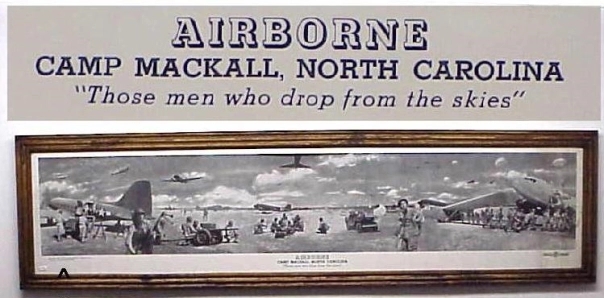

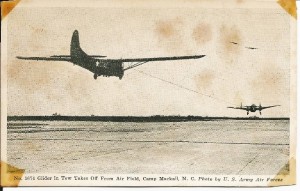


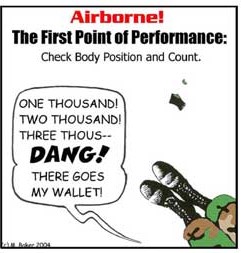
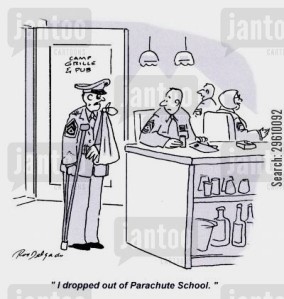
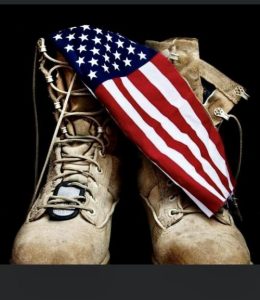







True pioneers! It must have been a real challenge building up from nothing.
LikeLike
I can’t imagine what it took to get things rolling on all this.
Thanks.
LikeLiked by 1 person
Thanks GP. I dropped out of parachute school also.
LikeLike
I’m sure it’s not for everyone.
Thanks for stopping by, Paol.
LikeLike
Your dad must have been one gutsy guy to go through that training, let alone the war. Amazing.
LikeLiked by 1 person
They did what they had to do back then. Wish we had more of that spirit today!
Thank you, Amy.
LikeLiked by 2 people
Didn’t realize the US was late in developing the airborne defense. That would have been a challenge to start from scratch. Never thought before about a jeep being parachuted to the ground. That would have been a hard landing.
LikeLiked by 1 person
The men need equipment once they land.
Thanks, Bev.
I’m always looking forward to your next trip into Americana!!
LikeLike
Sharpshooting, parachuting, and divorce – when it rains, it pours!
LikeLiked by 1 person
Yet, they pulled through.
Thanks for visiting, Gregory.
LikeLiked by 1 person
I am fascinated by your blog. I read most of your posts but dont often comment as I often don’t know what to say. My Dad and uncle fought in the war but only in Europe so reading about the Pacific theatre is very interesting as I didn’t know too much about it. Really interested posts. Thank you.
LikeLiked by 2 people
I deeply appreciate your comment. Thank you for visiting, James.
LikeLike
You are very welcome 🙂
LikeLiked by 1 person
Great to hear how shouting ‘Geronimo’ came about. Those men (including your dad) were much braver than me. I would have kept my feet on the ground, even for less pay.
Best wishes, Pete.
LikeLiked by 1 person
Thank you, Pete.
LikeLiked by 1 person
Another great history lesson. Thanks for sharing this.
LikeLiked by 1 person
Thank you for coming by!
LikeLike
Thank you for this terrific history. Tomorrow Hubby will read it and we’ll have a great discussion. I can’t tell you enough how important this series is – Smitty from ‘soup to nuts’ – marking history.
LikeLiked by 1 person
Thank you very much, Jennie. If Hubby has anything to add, don’t hesitate to bring it here!
LikeLiked by 1 person
He immediately remembered his training, what to do if you ejected from a fighter jet and used your parachute to land. Tuck and roll! Many in the training asked if they would jump from the jet. No, the DI said that would be practicing dying. The jump happened from a platform. His parachute training included wind and sea. Yes, he was pulled along the ocean while wearing an open parachute. That was tough. Hubby says hats off to your dad!
LikeLiked by 1 person
Thanks for returning, Jennie and letting me know what Hubby said! I appreciate you taking the time.
LikeLiked by 1 person
It was a pleasure, GP. You are a household name here.
LikeLiked by 2 people
Whoa! I never expected That!
Thank you!
LikeLiked by 1 person
Well, you are. 🙂 You’re welcome, GP.
LikeLike
Fascinating story, G. A side note, when we were kids in the late 40s we had a roof we would jump off of and yell Geronimo. Did you know that George Bush’s Grandfather allegedly participated in the theft of Geronimo’s skull as a member of Yale’s Skull and Bone Society?
LikeLiked by 1 person
No, I never heard that. Does that mean Yale still has it?
LikeLike
Great information, GP. I learn so much from your posts — sometimes wrenchingly sad but always deeply moving. The courage of these young men is incalculable.
LikeLiked by 1 person
I totally agree, Gwen.
LikeLike
I am truly enjoying this series, GP. When you think about the fact that these guys were breaking new ground in such a dangerous endeavor is asking things above and beyond the call before they even got into battle.
LikeLiked by 2 people
I can’t even imagine, Dan. All I keep thinking is, the more I learn, the more amazed I become!!
LikeLiked by 1 person
Great post and thanks. I like the thing on “Geronimo!”
LikeLiked by 1 person
Funny how some traditions start out, eh?!
LikeLike
Anything described as a “boxlike contraptions with wings” is a conveyance I would not get anything near.
LikeLiked by 1 person
It’s amazing what that generation did!
And I agree with you!
LikeLiked by 1 person
🙂
LikeLiked by 1 person
I’m enjoying the stories of the division as well as Smitty, GP. It’s fascinating to learn what individuals do with the circumstances of their time and day.
LikeLiked by 1 person
It was quite a lesson to me to learn what they all did, Mary. The more I learned, the more totally amazed I was!!
LikeLiked by 1 person
These were brave men, GP. I am so pleased that you are writing about your father. Thank you.
LikeLiked by 1 person
I appreciate you reading about him, Rebecca.
LikeLiked by 1 person
Thanks for this 1918 WW1. Thanks for this amazing photo..Anita
LikeLiked by 1 person
You’re welcome, Anita.
LikeLike
An excellent post, GP. My dad was 32 when he volunteered. He got the moniker of Pops as well. These were some men. Thanks for the history of the 11th.
LikeLiked by 1 person
My pleasure, John. I appreciate you stopping by.
LikeLiked by 1 person
Always a good thing to do. 😊
LikeLiked by 1 person
👍
LikeLiked by 1 person
Quite a challenge to become a paratrooper!
LikeLiked by 1 person
More so than I ever expected!
LikeLiked by 1 person
Any idea why Private Eberhard chose to shout out Geronimo?
LikeLiked by 1 person
Yes. His unit all went to see a movie the night before called ‘Geronimo’. Later on, Eberhard said he wasn’t nervous about the following day’s jump, but the other guys didn’t believe him – said he wouldn’t remember his own name. He said that when he jumped – he would yell, ‘Geronimo’ to prove them wrong!
LikeLiked by 1 person
Interesting backstory on how the airborne division came to be, GP. (I think everyone in Broad Channel could probably hear that siren considering its “dimensions” lol)
LikeLiked by 1 person
haha, I believe you are probably right, Bruce!!
LikeLiked by 1 person
Great informative post, GP! Thanks for sharing your knowledge.
LikeLiked by 1 person
Thanks for reading, Tim.
LikeLiked by 1 person
Great backstory on your dad.
LikeLiked by 1 person
Thank you, Jacqui.
LikeLiked by 1 person
The pressures of life, reality, war certainly change things!
LikeLiked by 1 person
My father felt his experiences made him a better person, but he might have been an isolated case of what I hear.
LikeLiked by 1 person
The vets I met were certainly more rounded and aware people back then, not so much now.
LikeLiked by 1 person
I’ve noticed as well, Paul. They have their own agenda.
LikeLike
Always so sad to lose comrades when in training…..
LikeLiked by 1 person
They form such a close bond.
Thank you, Helen.
LikeLiked by 1 person
Great history…..thanx chuq
LikeLiked by 1 person
Thanks for coming by, chug.
LikeLiked by 1 person
I always learn something.,…thanx chuq
LikeLiked by 1 person
Thank you, chuq!
LikeLiked by 1 person
😎
LikeLiked by 1 person
As one who has a fear of heights, I can’t imagine the amount of fortitude it must have taken to make that first jump from a 250′ tower. Would it be possible to stipulate glider service only (ha ha)?
LikeLiked by 1 person
That’s is what caused so many deaths, perfecting the gliders was no picnic either.
I can’t imagine what I’d do.
LikeLike
Fine post, GP. Never heard anybody ever yell Geronimo. I did hear one
yell ‘I don’t want to go’. I sure side with Smitty, I am afraid of heights and the only reason I liked to jump was for the extra pay. My jump pay got me a new motorcycle.
LikeLiked by 2 people
At least something good came out of your jumps, eh? Dad was afraid of heights because when he did get high up – he wanted to jump. He always thought one day he might not have a parachute!
LikeLiked by 1 person
Or aa twisted parachute.
LikeLiked by 1 person
He saw too many of those ‘streamers’.
LikeLike
Shake and pray. Shake and pray. No time to bother in an 800 foot combat jump.
LikeLiked by 1 person
👍
LikeLike
Great info on how dangerous that new concept was. I worked at Ft McNair named for GEN Leslie J McNair, who ended up being the highest ranked General Officer killed by enemy fire in WWII (if I remember correctly). Loved the ‘toons.
LikeLiked by 2 people
You sent me on a search to either confirm or deny it, this is what I found…
https://en.wikipedia.org/wiki/List_of_U.S._general_officers_and_flag_officers_killed_in_World_War_II
LikeLiked by 1 person
Thanks, GP. I knew he was promoted to 4 stars after he died. They redid his official portrait after his death and added the fourth star. He was supposedly very big into education.
LikeLiked by 1 person
Glad to help!!
LikeLike
“rules of land warfare”….just gets me. Hope you are well.
LikeLiked by 2 people
Thanks for stopping by, Matt.
LikeLiked by 1 person
Billy Mitchell! What an interesting man, as was his sister Ruth! (You sent me on a rabbit trail.) A fascinating post, GP!
LikeLiked by 1 person
Sometimes it’s fun falling down that rabbit hole!
Thanks, Joy.
LikeLiked by 1 person
I had no idea about how this came to be, and your father was a mighty brave man for many reasons. this being one!
LikeLiked by 6 people
Thank you so much for saying so, Beth!
LikeLiked by 1 person
It took plenty of guts and grit to persist in the division’s development despite the trials and many errors. But when the adversaries have a leg up on the techniques, you’ve got to follow through anyway.
LikeLiked by 3 people
Exactly. I wonder why it took them so long!
LikeLiked by 1 person
Thank you, Ned.
LikeLike
Thank you.
LikeLike
Pingback: Camp MacKall & the 11th Airborne Division are born – The Fourth Estate
Pingback: Camp MacKall & the 11th Airborne Division are born | Pacific Paratrooper | Ned Hamson's Second Line View of the News